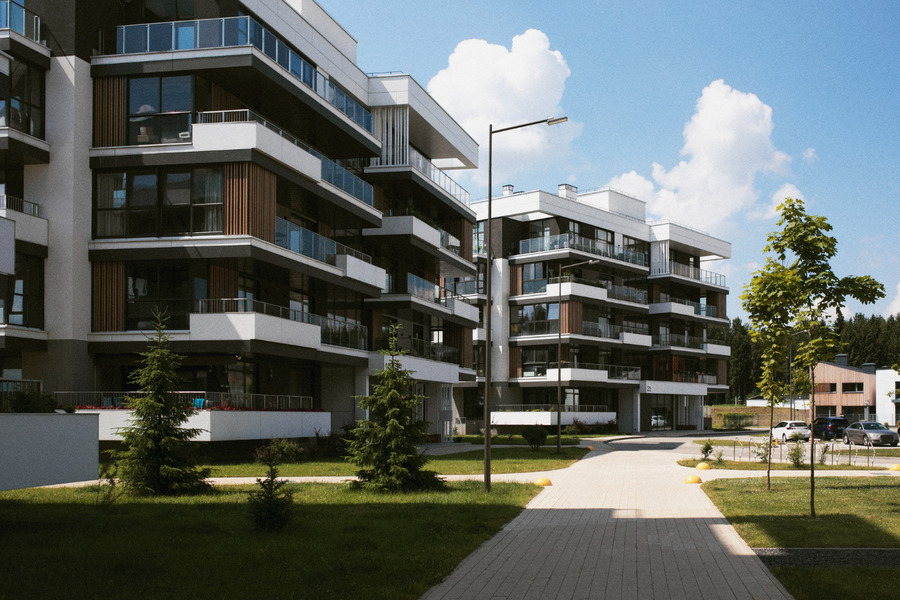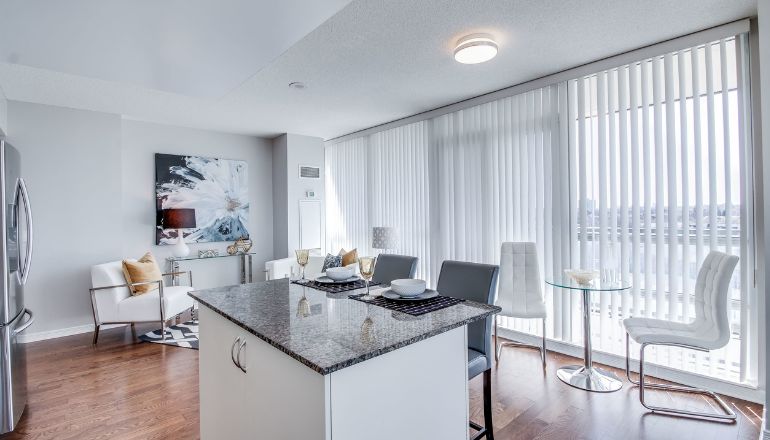Condo vs. Townhouse: Key Differences Explained

Buying a home is one of the biggest financial decisions you’ll make, and choosing between a condo and a townhouse can be surprisingly challenging. At first glance, they might seem similar both offer multi-unit living, shared walls, and community amenities. But dig deeper, and you’ll find key differences that impact ownership, costs, privacy, and lifestyle.
What’s the Difference Between a Condo and a Townhouse? Which one is the better investment? Which suits your lifestyle best? This guide breaks down the pros, cons, and key factors to help you make an informed decision.
Understanding Condos and Townhouses
When deciding between a condo and a townhouse, it’s essential to understand what each type of property offers. While both are types of residential homes, their structure, ownership, and living experience can differ significantly.
What is a Condo?
A condo, short for condominium, is a type of apartment-style property that you own but typically share walls with other units. In a condo, you own the interior of your unit, while the exterior and common areas, like hallways, gardens, and amenities, are managed by a homeowners’ association (HOA). Condos are often located in larger buildings or complexes, offering various amenities like gyms, pools, and security. Because of shared ownership of common areas, condo owners usually pay HOA fees that cover maintenance, repairs, and other services.
What is a Townhouse?
A townhouse is a multi-story home that shares one or more walls with neighboring units, but unlike a condo, it typically comes with its own private entrance. Townhouses often offer more space, with a front and backyard, and may have attached garages. Ownership in a townhouse extends to both the interior and exterior, meaning you’ll be responsible for maintenance and repairs of the property, including the outside.
Key Differences Between a Condo and a Townhouse
When choosing between a condo and a townhouse, understanding what’s the difference between a condo and a townhouse is crucial. These differences span ownership, maintenance, costs, privacy, and community features.
Ownership and Maintenance Responsibilities
In a condo, you own the interior of your unit, but the exterior and common areas are typically managed by a homeowners’ association (HOA). This means the HOA is responsible for maintenance and repairs in these shared spaces. On the other hand, in a townhouse, you own both the interior and exterior of your property. This includes responsibility for maintenance such as landscaping, roof repairs, and any external improvements.
Costs and Fees Comparison
Condos generally come with HOA fees that cover:
- Maintenance of common areas
- Building insurance
- Amenities (pools, gyms, etc.)
Townhouses typically have lower HOA fees but may have higher personal maintenance costs since you are responsible for both the interior and exterior of the property.
Privacy and Space Differences
Townhouses generally offer more privacy compared to condos, as they often feature private entrances, individual backyards, and sometimes even garages. Condos, being part of a larger building or complex, tend to have shared hallways and common areas, which can result in less privacy. Additionally, townhouse layouts typically offer more square footage and multi-story space, while condos are usually smaller and limited to a single floor.
Amenities and Community Features
Condos often provide a range of shared amenities such as pools, gyms, security services, and more. These amenities are maintained by the HOA and are available to all residents. Townhouses, however, may not offer as many amenities, especially if they are part of a smaller community or development. However, some townhouse communities may still provide features like parks, walking trails, or a small pool, often with fewer residents sharing them, making for a more private experience.
Pros and Cons of Buying a Condo
When considering buying a condo, it’s important to weigh the benefits and drawbacks to make the best choice for your lifestyle and investment. Condos offer unique advantages, but there are also challenges to consider before making a purchase.
Benefits of Living in a Condo
Living in a condo can offer several advantages that enhance convenience, security, and lifestyle. Here are some key benefits:
- Convenience: Condos are often located in prime urban areas, offering easy access to restaurants, shops, and entertainment.
- Amenities: Many condos come with shared amenities like pools, gyms, and concierge services, providing a high standard of living without the need to maintain these facilities.
- Security: Condos typically have security features such as gated entrances, surveillance cameras, and sometimes even 24/7 staff, enhancing safety.
- Lower Maintenance: Since the HOA handles exterior and common area maintenance, condo owners are relieved of these responsibilities, freeing up time and reducing personal costs.
For those interested in condo investment opportunities, you may want to Invest in Toronto Preconstruction Condos.
Drawbacks to Consider
While condos offer many benefits, there are some drawbacks that might not align with every homeowner’s needs:
- HOA Fees: While the maintenance of shared spaces is covered, these fees can be quite expensive and increase over time, impacting your budget.
- Limited Privacy: Sharing walls and common areas with neighbors means less privacy compared to other property types, like townhouses or single-family homes.
- Space Constraints: Condos tend to offer less square footage, which can be limiting if you need more space for storage or if you have a growing family.
- Rules and Restrictions: HOAs often enforce strict rules regarding noise, pets, and renovations, limiting personal freedom in your living space.
You can explore available listings for Preconstruction Condos to see what fits your needs.
Pros and Cons of Buying a Townhouse
Buying a townhouse comes with its own set of benefits and challenges. Understanding these can help you determine if a townhouse fits your lifestyle and financial goals.
Advantages of a Townhouse
Townhouses offer a variety of advantages, making them an attractive option for many buyers. Some of the key benefits include:
- More Space: Townhouses typically provide more living space compared to condos, often with multiple floors, larger kitchens, and private outdoor areas.
- Private Entrance: Unlike condos, townhouses generally have their own entrance, offering more privacy and a sense of ownership.
- Ownership of Exterior: You own both the interior and exterior of the townhouse, giving you control over maintenance, renovations, and improvements.
- Community Atmosphere: Many townhouse communities are smaller and offer a more close-knit feel, with neighbors who share similar property management and upkeep responsibilities.
For more details, refer to the Complete Guide to Pre-Construction Townhomes.
Potential Downsides
While townhouses have many advantages, there are a few potential downsides to consider:
- Higher Maintenance Responsibilities: As a townhouse owner, you’re responsible for the maintenance of both the interior and exterior, including landscaping and repairs.
- HOA Fees: Some townhouse communities have HOA fees that cover common areas and amenities, but these fees can add up, depending on the community’s features.
- Less Privacy Than a Single-Family Home: Although townhouses offer more privacy than condos, they still share walls with neighbors, which can affect noise levels and personal space.
- Limited Outdoor Space: While some townhouses may include small yards or patios, they usually have less outdoor space compared to a single-family home.
You can explore available listings for a Preconstruction Townhome to find your ideal property.
Which One Is Right for You?
When deciding between a condo and a townhouse, it’s important to evaluate your priorities, preferences, and lifestyle. Here are some key factors to consider to help you make the right choice for your living situation.
Factors to Consider Before Buying
Before making your decision, consider the following factors to ensure you choose the best option for your needs:
- Budget: Condos typically have lower upfront costs, but you’ll need to factor in HOA fees. Townhouses may have higher purchase prices, but they often have lower HOA fees and more space.
- Maintenance: Condos require less personal maintenance, as the HOA handles the exterior and common areas. Townhouses, on the other hand, require more hands-on care, as you’re responsible for both the interior and exterior.
- Privacy: If privacy is a major priority, you might prefer a townhouse, as they typically offer more personal space and fewer shared walls compared to condos.
- Location: Condos are often found in more urban, high-density areas, while townhouses are more common in suburban or family-friendly neighborhoods. Your preferred location can play a large role in your decision.
Consider these factors while thinking about what’s the difference between a condo and a townhouse to make the most informed choice.
Making the Best Decision Based on Your Lifestyle
Your decision should be based on how well each property type fits your lifestyle and needs:
- For those seeking convenience and low maintenance: A condo could be the best choice if you want a low-maintenance lifestyle with easy access to amenities and a central location.
- For those valuing space and ownership control: A townhouse may be a better fit if you need more space, privacy, and control over your property’s maintenance and appearance.
Conclusion: Condo vs. Townhouse: Which One Wins?
The choice between a condo and a townhouse depends on your lifestyle, budget, and personal preferences. Condos offer convenience and low maintenance, while townhouses provide more space and privacy. There’s no definitive winner only the best fit for your needs. Take the time to evaluate your priorities, and you’ll find the right home for you.














